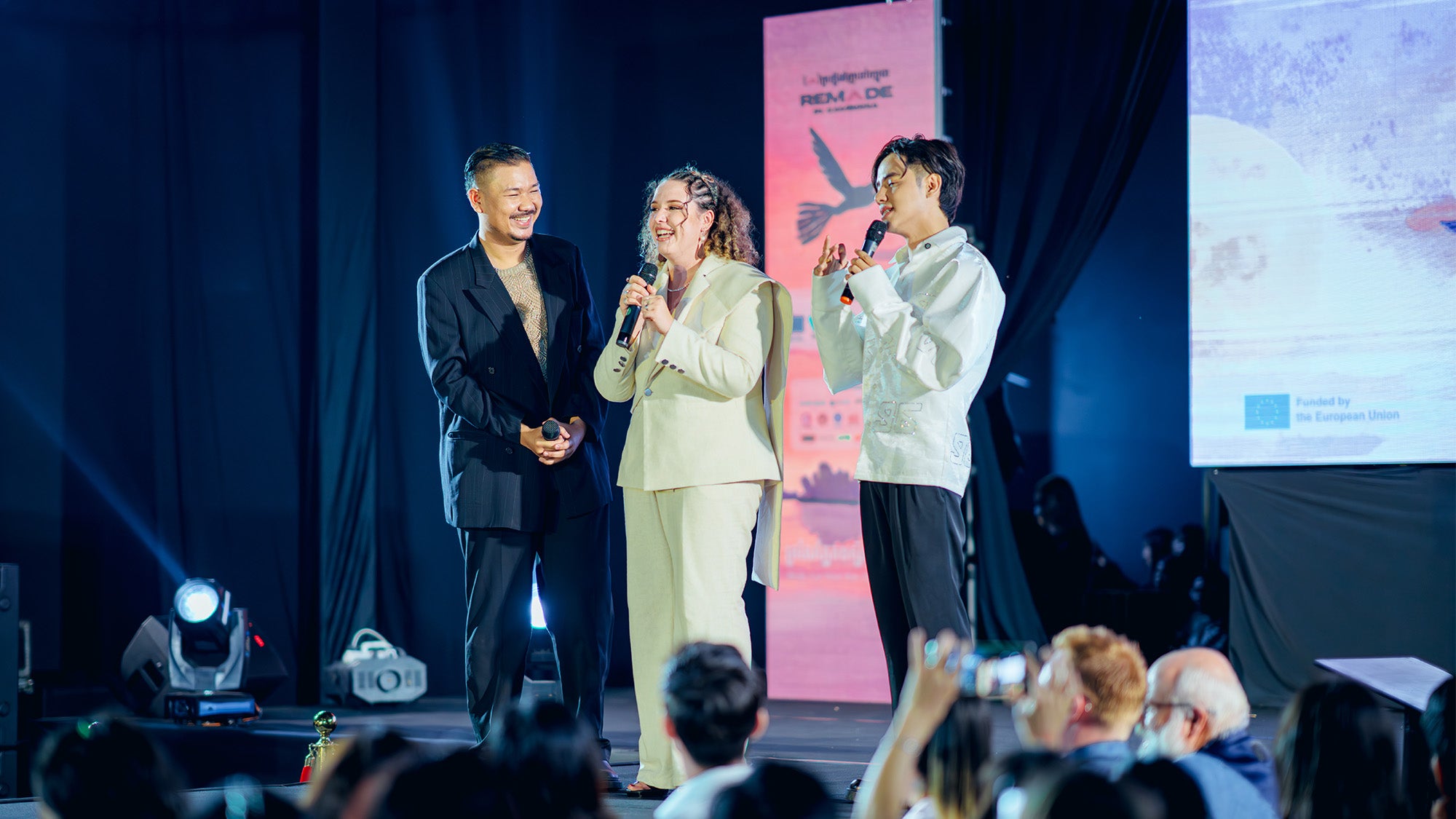Global Health Alum Transforms Cambodian River Waste into Sustainable Fashion
Top Image: Alyssa Erin Kardos Loera (pictured center) takes the stage at the Birds’ Eye View: Bak-Sei Tonle Sap Fashion Show, held March 23 in Phnom Penh, which showcased 30 Cambodian designers, 33 professional models and 80 costumes, and featured other special performers. (Image: ReMade)
(April 22, 2024) — Alyssa Erin Kardos Loera (NHS’21) credits her Georgetown experience with preparing her for her current role as CEO of ReMade in Cambodia, which she founded there while serving as a Fulbright English teaching assistant. Working with local young designers, the enterprise collects and then transforms textile river waste into sustainable wearable products.
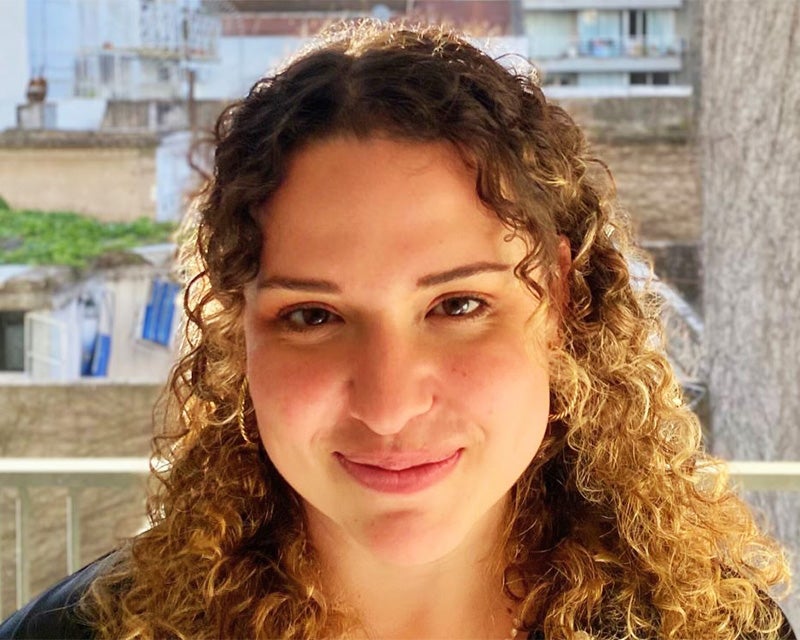
Alyssa Erin Kardos Loera (NHS’21)
Kardos Loera recalled how the global health program (then at the School of Nursing & Health Studies, now a part of the School of Health), with the majority of its professors being from outside the United States, stressed putting people first in any initiative and making sure their voices were heard. “That was repeated in every, every class that I took,” she said. “It was really considering where people are coming from and what their daily battles are. And so I think that that has informed my experience here.”
She added that Georgetown’s tenet of cura personalis (Latin for “care for the whole person”) also remains a strong influence.
“The cura personalis perspective gives me a lot of patience,” she said. “Putting the people first helps in the work and then also just as an approach to living.”
While at Georgetown, Kardos Loera joined its Laboratory for Global Performance and Politics, which strives to humanize politics through art. Working there allowed her to meld her passion for fixing systemic injustices with her passion for the arts.
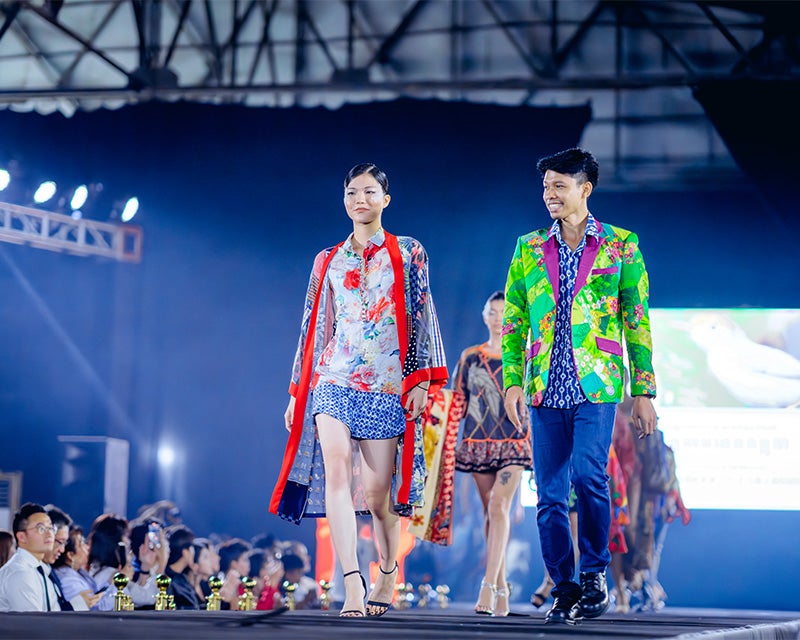
ReMade stages performative runway shows that also celebrate Cambodian dance and poetry. (Image: ReMade)
“I believe that the arts are a great way for engagement, whether it’s in health or in politics,” she said.
Kardos Loera continues to build on those passions at ReMade in Cambodia, staging performative runway shows that also celebrate Cambodian dance and poetry, and working to give exposure to local Khmer designers who are underrepresented in the country’s fashion industry. In addition, ReMade pays designers to display their creations in its shows, while other fashion shows charge designers to participate.
“When I came here, the fashion weeks or shows were mostly foreign designers,” she said. “But for the first time the primary fashion show of Cambodia this next season is actually majority Khmer designers.”
An Early Awareness of Differences
Kardos Loera traces her interest in global health to her upbringing in southern California. As she grew up, her family volunteered several times a year at shelters and other organizations in Baja California and across the border in Mexico. While talking to the children of migrant farm workers, she learned that their parents couldn’t afford to buy the fruit that they were picking.
Kardos Loera also saw how many infants and children were dying because of malnutrition or lack of access to health care. “So I’ve seen all these disparities and injustices and differences in such close proximity,” she said. “I just wanted to understand why. So that’s why I wanted to study global health and I wanted opportunities to go abroad to other communities to other spaces to learn more. And I felt that Georgetown was the place to do that.”
As part of a School of Foreign Service course on Cambodia’s art and politics, Kardos Loera planned to spend her spring break during her junior year in Cambodia, but the emergence of COVID prevented it. She was able to rectify that missed opportunity after graduation when she received Fulbright funding to assistant teach in a Cambodian public high school.
In June 2022, after learning more about Cambodia’s fashion industry and its waste, Kardos Loera organized a sustainable runway show in Phnom Penh in which 90% of the clothes were recycled or upcycled, mostly by local designers. After her Fulbright year, she returned to Cambodia with an IIE Centennial Fellowship to establish an upcycling studio.
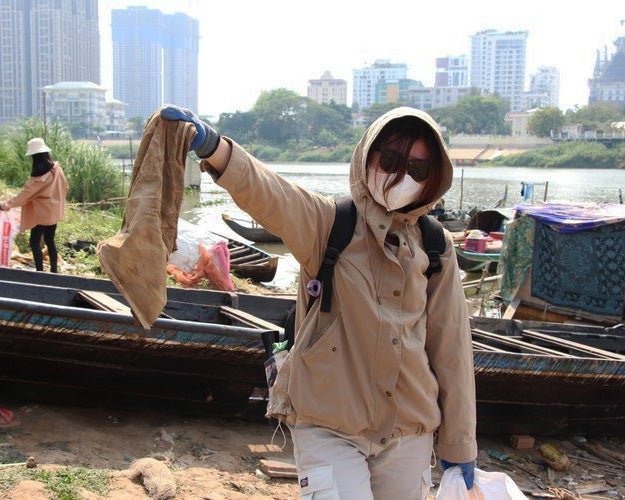
In Phnom Penh, 20% of the waste in rivers is textile waste. (Image: ReMade)
Fashion is Cambodia’s largest industrial sector, with more than 550 garment factories accounting for 80% of total exports. It is also the world’s third most polluting industry, behind only fossil fuels and agriculture, creating millions of tons of waste every year.
In Phnom Penh, 20% of river waste comes from textile waste, including factory seconds or fabric waste dumped by apparel manufacturers. ReMade is studying all the different materials that end up in Cambodia’s rivers, from jeans to fishing nets to curtains to factory-dumped T-shirts.
“Once we have that research, we’re going to design products to address each textile, each form of textile waste, so that each is accounted for,” Kardos Loera said. The company is also connecting with banks, malls, hotels and other businesses in the community to learn what textile products they may need on a regular basis, such as tote bags.
A Three-Year Plan
Invited to the Global Fashion Summit, Kardos Loera was able to connect there with upcyclers in Ghana, which led to conversations with similar groups in Nigeria and Kenya. In December, she visited upcycling programs in Argentina, Chile, Ecuador and Peru. That research will help Kardos Loera in the next stage of her plans for ReMade.
“What we are interested in doing is scaling up upcycling, making a framework so that more women can work in their homes and can use all of this waste in Cambodia as an opportunity to support their family or as an economic opportunity,” she said. She hopes to have that framework up and running within three years so that she can go to graduate school to study international development.
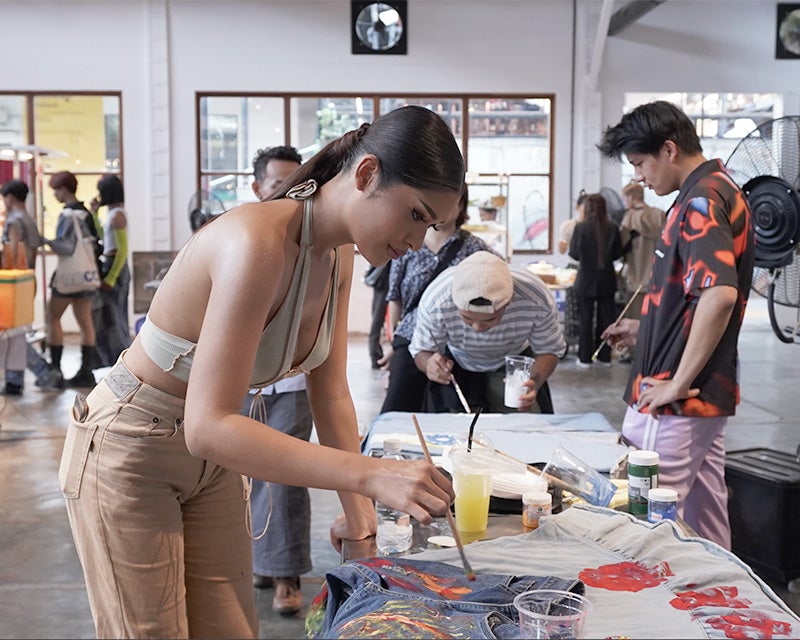
ReMade holds smaller workshops on fashion-related topics such as painting clothing. (Image: ReMade)
ReMade just staged its third large fashion show, but also holds smaller workshops on fashion-related topics such as painting clothing, upcycling hats, learning how to model or how to apply makeup.
At its upcycling studio, visitors will be able to learn about the impact of textile waste and engage with Cambodian fashion and arts. The back half will be the actual studio for developing products, while the front will offer finished items for sale.
Down the road, Kardos Loera wants to explore how ReMade might raise awareness around climate change and engage people in public health projects and other areas of activism. She’s also working on pairing with a design school abroad to provide educational programming. She envisions ReMade ultimately being replicated to provide economic opportunity throughout Cambodia and elsewhere in Southeast Asia.
Ultimately, Kardos Loera also plans to hand over the leadership of ReMade. “I think ReMade in Cambodia should be led by a Cambodian,” she said. “Having that leadership is a goal in the next three years.”
Michael von Glahn
GUMC Communications

